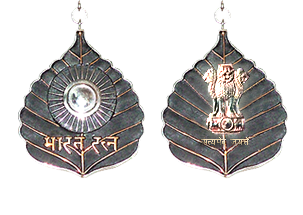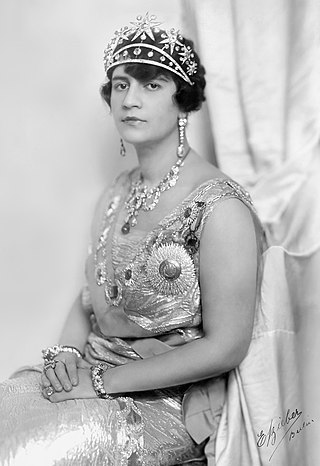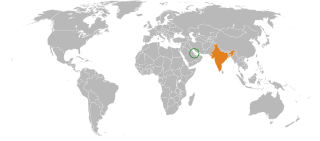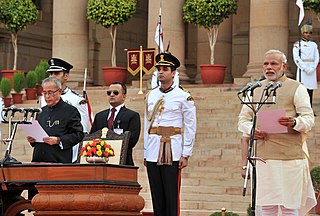
Jalalabad is the fifth-largest city of Afghanistan. It has a population of about 356,274, and serves as the capital of Nangarhar Province in the eastern part of the country, about 130 kilometres (80 mi) from the capital Kabul. Jalalabad is located at the junction of the Kabul River and the Kunar River in a plateau to the south of the Hindu Kush mountains. It is linked by the Kabul-Jalalabad Road to the west and Peshawar in Khyber Pakhtunkhwa, Pakistan, to the east through Torkham and the Khyber Pass.

Narendra Damodardas Modi is an Indian politician who is the 14th and current Prime Minister of India since 26 May 2014. Modi was the chief minister of Gujarat from 2001 to 2014 and is the Member of Parliament (MP) for Varanasi. He is a member of the Bharatiya Janata Party (BJP) and of the Rashtriya Swayamsevak Sangh (RSS), a right wing Hindu nationalist paramilitary volunteer organisation. He is the longest-serving prime minister outside the Indian National Congress.

The Third Anglo-Afghan War began on 6 May 1919 when the Emirate of Afghanistan invaded British India and ended with an armistice on 8 August 1919. The Anglo-Afghan Treaty of 1919 resulted in the Afghans gaining control of foreign affairs from Britain and the British recognizing the Durand Line as the border between Afghanistan and British India.

Ghazi Amanullah Khan was the sovereign of Afghanistan from 1919, first as Emir and after 1926 as King, until his abdication in 1929. After the end of the Third Anglo-Afghan War in August 1919, Afghanistan was able to relinquish its protected state status to proclaim independence and pursue an independent foreign policy free from the influence of the United Kingdom.

Nishan-e-Pakistan is the highest civilian award of the Islamic Republic of Pakistan. It is awarded to "those who have rendered services of highest distinction" to the national interest of Pakistan. Nishan is awarded to government officials and civilians, including citizens of Pakistan and foreign nationals. In the Pakistan honours system, Nishan-e-Pakistan is equivalent to Nishan-e-Haider, the highest military gallantry award. Established on 19 March 1975 under the Decorations Act, 1975, the award is not correlated to the rank or status of a person.

The Indian honours system is the system of awards given to individuals for a variety of services to the Republic of India. The categories of awards are as follows:
The Order of Fiji is the highest honour of the Fijian honours system. Established 1 March 1995, the order is presented for achievement and merit to Fiji and mankind as a whole. The order is divided into a general division and military division, and is presented in three classes, with an associated medal.

The Hilaal-e-Imtiaz, also spelled and transliterated as Hilāl-e-Imtiyāz, is the second-highest civilian award and honour given to both civilians and military officers of the Pakistan Armed Forces by the Government of Pakistan. It recognises individuals who have made an "especially meritorious contribution to the security or national interests of Pakistan, world peace, cultural or other significant public endeavors". It is a civilian award, and not limited to the citizens of Pakistan.

Soraya Tarzi was the first queen consort of Afghanistan as the wife of King Amanullah Khan. She played a major part in the modernization reforms of Amanullah Khan, particularly in regard to the emancipation of women.

Political, socio-economic, military and cultural ties exist between India and Bahrain. India is a close ally of Bahrain. As per Indian officials, the Kingdom along with its GCC partners are amongst the world's most prominent supporters of India's candidacy for a permanent seat on the UN Security Council, and Bahraini officials have urged India to play a greater role in international affairs. For instance, over concerns about Iran's nuclear programme, Bahrain's Crown Prince requested India to play an active role in resolving the crisis.

The Order of Zayed is the United Arab Emirates' highest civil decoration named after the first president of the UAE, Zayed bin Sultan Al Nahyan.

Arshad Sami Khan was a Pakistani diplomat, civil servant and fighter pilot who at peak of his career attained the highest rank of Federal Secretary. He started his career as a Pakistan Air Force fighter pilot and later served three presidents of Pakistan as their aide-de-camp (ADC) and later went on to the Ministry of Foreign Affairs where he served three presidents and four prime ministers as chief of protocol. He was later appointed as a diplomatic ambassador of Pakistan to 14 countries. This was followed by his appointment as the first commissioner general of Pakistan. He was also Federal Secretary of Culture and retired as a top BPS-22 grade bureaucratic officer. He was also the father of singer and music composer Adnan Sami.

Narendra Modi, parliamentary leader of the Bharatiya Janata Party, started the first tenure of his prime ministership, after his oath of office as the 14th Prime Minister of India on 26 May 2014. 45 other ministers were also sworn in along with Modi. The ceremony was noted by media for being the first ever oath of office of an Indian Prime Minister to have been attended by the heads of all SAARC countries.

Naheed Abidi is an Indian scholar of Sanskrit and writer. In 2014, she was honoured with Padma Shri, the fourth highest civilian award, for her contributions to the field of literature by the Government of India.
Orders, decorations and medals of the State of Palestine are awarded according to a system established and implemented during the period 2009-2018 within the frame of the institutional and state-building process.
The Most Honourable Order of the Distinguished Rule of Izzuddin, or more informally the Order of Nishanizzuddin, is the highest Maldivian honour which may be conferred upon a foreign national.
The King Hammad Order of the Renaissance is the third-highest civilian honour of Bahrain decoration named after King Hamad.

The Ghazi Mir Bacha Khan Medal is both a civilian and a military award, designated a High State Medal, in Afghanistan. The medal is named in honor of Ghazi Mir Bacha Khan, an ethnic Tajik from Mir Bacha Khan district, on the Shamali Plain, located to the north of Kabul city. The district was named for Mir Bacha Khan and people called him “Ghazi Mir Bacha Khan Kohdamani”. He a hero of the Second Anglo-Afghan War, 1878-80. The award is a tribute to Ghazi Mir Bacha Khan's legacy and his lifelong commitment to non-violent resistance and social justice.












